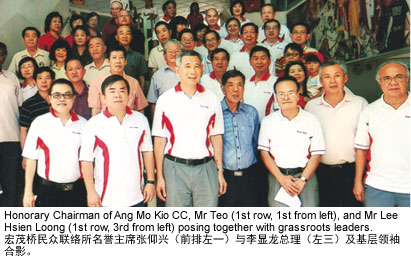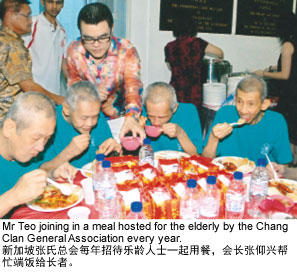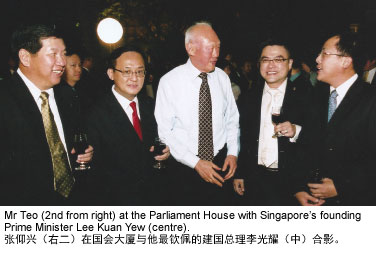 Mr Teo was in characteristic good spirits when we interviewed him.
Mr Teo was in characteristic good spirits when we interviewed him.
“Why shouldn’t you speak? Not doing so is giving yourself the death penalty!
“I tell myself I can do it! What am I afraid of?
“I make sure I have at least one sale a day. There is no reason why this is not doable!
“In the end, people leave the world empty-handed, like they came into it.”
Such sentiments are very motivating. They are also open-minded, optimistic and of educational value.
EduNation approached Mr Jackson Teo for an interview for our section Inspiring Lives. Mr Teo, who actively contributes to both charity and the community, accepted our request immediately.
The More You Give the More You Receive
 When we spoke with Mr Teo about giving and receiving, he simply had this to say, “We come into this world empty-handed and we’re going to leave it the same way. So everything can be given up.” When we spoke with Mr Teo about giving and receiving, he simply had this to say, “We come into this world empty-handed and we’re going to leave it the same way. So everything can be given up.”
He sympathised with many friends who had felt very deeply about their losses. “What is loss? Some people have lost $1 million, but I ask, ‘From where did you get this money? You had nothing in the beginning!’ The money is given to you by Heaven, and when it is taken away the same way, so be it,” said Mr Teo.
Not long ago, he received news that one of his friends from Katong Shopping Centre had passed away. His first thought upon hearing the news was, “So be it.” This friend had owed him a rather large sum of money, but Mr Teo decided not to pursue the matter further, and he even helped the bereaved family cope with their loss.
“Wealth and status are material things, and they are given to us by Heaven for temporary safekeeping, so there’s no need to force anything. In this line of business, some customers buy an entire set of karaoke equipment which they then want to return after they become sick of it. They find flaws in everything, and speak badly about the equipment they have bought. I tell my employees to just accept these goods and refund them their money; there is no need to become further embroiled in the issue. I treat these cases as doing good. And when I think about it like that, I can easily come to terms with it. It is a small matter anyway, why be upset about it?”
With such a mindset it is no surprise that Mr Teo has given generously to charity for the past ten years. He is also active in voluntarism and community programmes. But while he is busy giving, Mr Teo has also received — he has been awarded the Public Service Medal and elected as the president of Chang Clan General Association and council member of the Singapore Federation of Chinese Clan Associations. And on top of everything else, his business has continued to grow.
Mr Teo spoke to us about his humble beginnings, and how through hard work and perseverance he has managed to be successful and to give back to society.
Father and Son Remember Their Roots
Mr Teo (53 years old) grew up in a family that relied on hard work. His father owned a factory that manufactured the Basketball brand peanut butter and coconut jam, which was sold to sundry stores big and small in Singapore. His father had a generous heart, and besides sending remittances to relatives back in his hometown of Chaozhou in China, he would frequently lend money to his friends.
At his father’s instigation, Mr Teo wrote regularly to his cousin in Chaozhou. This correspondence laid the foundation for a good relationship between the two of them. Later, when Mr Teo became the distributor of BMB karaoke systems for Southeast Asia and China, he invited his cousin to come into the business, saying, “If it makes money you can keep the profits, but if it turns out to be unprofitable I will shoulder the losses.” Later, when the cousin set up a factory in Wuhan and started doing well, he invited Mr Teo to join him using the same words. Mr Teo and his father were both generous when it came to money, and the many contributions to their relatives back in China forged a strong family bond.
But because the senior Mr Teo was generous to a fault, his company, staffed by 30, collapsed.
“My father was too nice, so he was a little casual when it came to business, which was not the way to be successful. When I was 21 he was declared bankrupt. But even before then, my mother managed the family and we were extremely frugal. Our family of seven lived in a one-room flat in Circuit Road then,” recounted Mr Teo.
A Strict Upbringing
The fact that Mr Teo has managed to do so well for himself in business has got a lot to do with his strict upbringing. He was the third of five children, and had both an elder and a younger brother and sister. His father used to instruct them all about etiquette at the dining table, how to treat people and things, how to talk to others and so on. When he recalled his father’s manner, Mr Teo likened it to military training as it was that strict. What he remembered most vividly was being woken up by his father whenever he came home slightly worse for wear after an evening’s drinking. Mr Teo would then have to listen to his father’s teachings until he was allowed to go back to sleep.
Of the five siblings, Mr Teo was the one who most liked to go to his father’s factory to help out. Because he was willing to learn and do, he was better than most of the employees. His hard work was noticed, and when it was time to pay the wages, the manager would give him a little extra in appreciation. Mr Teo often accompanied his father, too, when he went about his business dealings, acting as a translator between Mandarin and Teochew. It was experiences like this that led him to decide to become a man of business himself.
Primary Education
 Besides his upbringing, what he was taught in school also had a huge influence on Mr Teo. When he was attending Kong Hwa School the ethics and civics classes taught him to respect his teachers and be filial to his parents. Of all the things he learnt, he remembered Di Zi Gui (The Standards for Being a Good Student and Child) best. Besides his upbringing, what he was taught in school also had a huge influence on Mr Teo. When he was attending Kong Hwa School the ethics and civics classes taught him to respect his teachers and be filial to his parents. Of all the things he learnt, he remembered Di Zi Gui (The Standards for Being a Good Student and Child) best.
Because he had a weak constitution and often fell ill, he had to repeat Primary 6. He told us that whenever he felt unwell, his form teacher would bring him to the canteen and buy him some milk, or take him into the Principal’s office where the Principal himself would give him a head massage. He still remembers these little acts of kindness and is deeply grateful for the care that his Principal and teachers used to show him.
The year he repeated Primary 6, he met a boy by the name of Wu Jin Nan. They became good friends and Jin Nan introduced him to sports, which improved Mr Teo’s health. He also constantly nagged the young Mr Teo to improve his penmanship, and to study hard. Spurred on by such admonitions, Mr Teo realised that studying wasn’t that hard after all, and he managed to graduate. He went on to First Toa Payoh Secondary School while his friend entered Dunman High School but when he misplaced the book which contained Jin Nan’s well wishes and contact details, Mr Teo lost touch with him, which is something he regrets to this day.
The Courage to Speak and Do
Mr Teo had set himself the goal of becoming a successful businessman but to do this he first had to know his own strengths. Since he liked to talk, he spoke at length whenever he accompanied his father.
“If you don’t speak up, you are doing yourself a disservice,” said Mr Teo. With this belief, he got a job as a salesman. Although he suffered many setbacks, Mr Teo always picked himself up and forged ahead again. Unfortunately, though, this trait often got him into trouble with his father — but Mr Teo wanted to learn, so he continued to speak his mind and just accepted the scoldings.
Because he was deaf in his right ear, Mr Teo was exempted from national service. To make up for his hearing loss, and so as not to waste this two and a half years, he decided to work hard on his verbal skills. First he became a salesman for Singer sewing machines, but he later went on to sell televisions, refrigerators, stoves, encyclopaedias, pots and pans, and kettles. These experiences went a long way in helping him perfect his sales pitch. He also developed a thorough knowledge of whichever product he was selling in order to impress his customers even more.
Every day he would knock on some 200 doors. When business was brisk, he could secure three or four orders on a daily basis but when things weren’t going so smoothly he would return home empty-handed.
Throughout, he never allowed himself any excuses and he never relaxed his target of making at least one sale each day. This went on for five years — at the end of which he felt he had become the best salesman he could be.
When he switched to selling BMB karaoke systems he also set up a karaoke lounge and became the product distributor for Southeast Asia. Two years later, he clinched the dealership for China as well. This meant that he had annually to sell equipment to the value of $6 million and $15 million in these two regions. Faced with such an enormous challenge Mr Teo was nevertheless confident, and fuelled by his strong self-belief he went on to build a name for himself and his company.
A Regular Face at Police Stations
Back then, payment by instalments was the single most important factor in helping Mr Teo close his deals. However, this meant that he ran the risk of customers taking the goods and not paying up. There were also customers who were already so far in debt that when they bought a karaoke system it was taken away by loan sharks the very next day. Therefore, whenever he went to deliver a product, Mr Teo would keep an eye out for customers who looked likely to default.
“One in six of my sales ended up with me neither able to collect the money nor take back the goods. In these instances I would go to the police. The police would suggest that I get a lawyer, but I knew my rights by then, and I would quote certain relevant laws which forced them to help me. It wasn’t long before I knew every police station in Singapore, and I even made friends with some of the officers,” said Mr Teo.
But there were good customers along with the bad. Once, he forgot to collect money from an elderly gentleman and by the time he remembered, six months had already gone by. When he finally looked him up the man repaid every instalment without question. This moved Mr Teo, greatly. And indeed, talking about this incident led him to reiterate his philosophy for life: you need to sow your own seeds before you can reap your own rewards. If you are upright yourself people will be straight with you.
The Singing Karaoke Owner
Mr Teo is also known as the Charity Karaoke Singer, and singing is his second strength. When he was in primary school his classroom was next to the music room, and whenever he heard a teacher sing he would start to hum and sing along.
But what really gave him confidence was his elder sister’s comment when he was in Primary 5. One day, he was singing along with Taiwanese favourite Yang Xiao Ping’s Jin Ye Yu Meng Meng. After the song ended, his sister exclaimed, “That was really good!’ From then on he worked hard on his singing, too. In both primary and secondary school he would sing before lessons, which was something his classmates loved. Later he took this talent even further, taking part in more than a hundred local competitions. To this day the trophies line the walls of his house.
It was because he loved singing so much that he started to notice the karaoke systems that were growing in popularity in the 1980s. Selling professional BMB karaoke equipment seemed like a good path for him to take. When he began to sell the equipment he used to bring a portable speaker with him and sing along with the music. He would do this in shopping centres and in coffee shops, singing loudly and enjoying himself. Every time he received a complaint police officers would turn up to show their concern, but they were clearly enjoying listening at the same time.
“People thought I was strange, but I didn’t mind at all. The business was booming! I would bring my sister along, and as I sang she would take orders for the karaoke system on the side,” said Mr Teo.
In 2011 he released his first solo album Bao Da. The reception was very good, and it sold 5,000 copies at $12.90 each. Mr Teo gave all the proceeds to charity.
Teo Heng KTV Karaoke Studio, which he established and still manages, serves two purposes. It is a demonstration space for the equipment which he is selling, and it is also a place where youngsters can enjoy some innocent recreation. He doesn’t sell tobacco or liquor on his premises, but soft drinks are available at a dollar each. Customers can also bring their own food. Some industry players thought he was crazy, and were certain that such a business model would fail.
Surprisingly, Teo Heng KTV Karaoke Studio just kept growing — from the original five-room setup in Katong Shopping Centre to the 34 rooms that it boasts today. There are three more branches: one, an 11-room lounge in the NTU Alumni Club at Buona Vista; a second 22-room studio in Sembawang Shopping Centre; and a third which is set to launch at Junction 10 in September this year. He also has a 50-room karaoke studio in Kuala Lumpur, Malaysia, and he has plans for still more expansion elsewhere.
Teo Heng KTV Karaoke Studio provides a conducive environment for recreation, without cigarettes or alcohol. Its charges are low, and it is an ideal place for students and young people who like to sing karaoke to hang out. The youthful energy and sunshine of his young customers makes him feel happy. He hopes that by giving them a safe place where they can relax and sing they will lead healthy lives and not fall by the wayside.
Therefore, for the future of his young clientele, Mr Teo is more than willing to keep his crazy business model going.
Translated by: Lee Xiao Wen
|